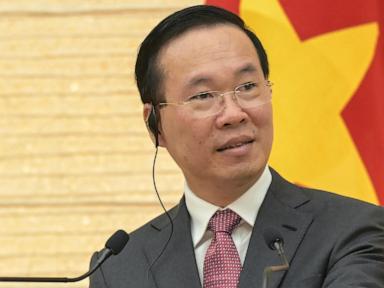Vietnam’s political landscape witnessed a significant shift as Vice President Vo Thi Anh Xuan assumes the role of acting president following the resignation of her predecessor, reported a Communist Party newspaper on Thursday.
The departure of President Vo Van Thuong, who resigned due to unspecified violations detrimental to the party and the state’s reputation, marks a noteworthy development just a year into his tenure. This unexpected move has raised concerns among foreign investors about political stability in Vietnam, a nation pivotal in the global manufacturing arena and caught in the crossfire of U.S.-China geopolitical competition.
Vo Thi Anh Xuan, aged 54, had previously served as acting president and became vice president in 2021, according to Tuoi Tre daily.
President Thuong’s resignation, though lacking specific details about the violations, is seen in the context of Vietnam’s ongoing anti-corruption campaign. Analysts interpret the party’s language as an indication of his involvement in these efforts.
VP Vo Thi Anh Xuan (Credits: KTLA)
The abrupt departure of Vo Van Thuong, once considered a protégé of Communist Party chief Nguyen Phu Trong, has been described as a “political earthquake” by Nguyen Khac Giang, an analyst at Singapore’s ISEAS-Yusof Ishak Institute. This event is likely to trigger a complex succession process within the party, with ramifications expected until the National Congress in 2026, a crucial event where Trong’s successor will be decided.
Trong, known for his ideological conservatism and tenure since 2011, has made combating corruption a cornerstone of his legacy. The presidency, while largely ceremonial, holds strategic importance in Vietnam’s political hierarchy, positioning its occupant favorably for future leadership roles within the party.
Thuong’s resignation coincides with the arrest of a former provincial head on corruption charges dating back to his tenure. These developments underscore the intensified anti-corruption efforts spearheaded by Trong, which have also led to concerns about their impact on Vietnam’s business environment and foreign investment.
Vietnam’s delicate geopolitical balancing act between China and the U.S. is further complicated by these internal political dynamics. Despite its efforts to attract foreign businesses seeking to diversify their supply chains away from China, uncertainties arising from political transitions have made investors wary.
The postponement of a state visit by the Dutch royal family and the delay of a planned visit by the World Bank president amid rumors of potential political changes reflect the heightened sensitivity surrounding Vietnam’s domestic circumstances.
Vietnam finds itself at a critical juncture, navigating internal political transitions while striving to maintain its economic momentum and international relationships amidst evolving global dynamics.
